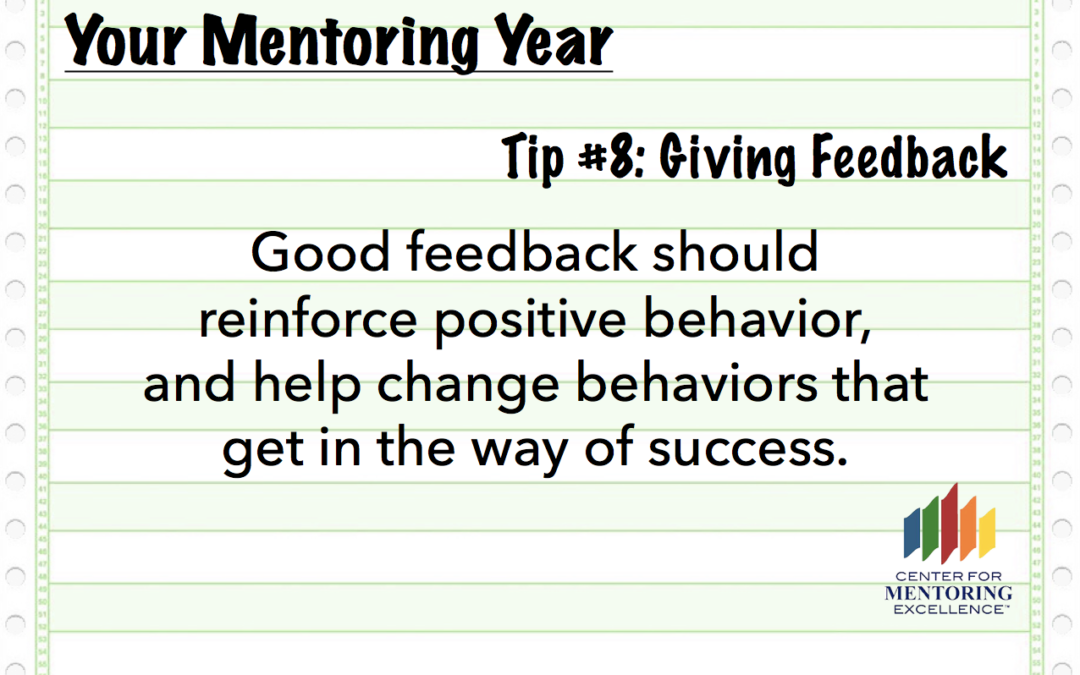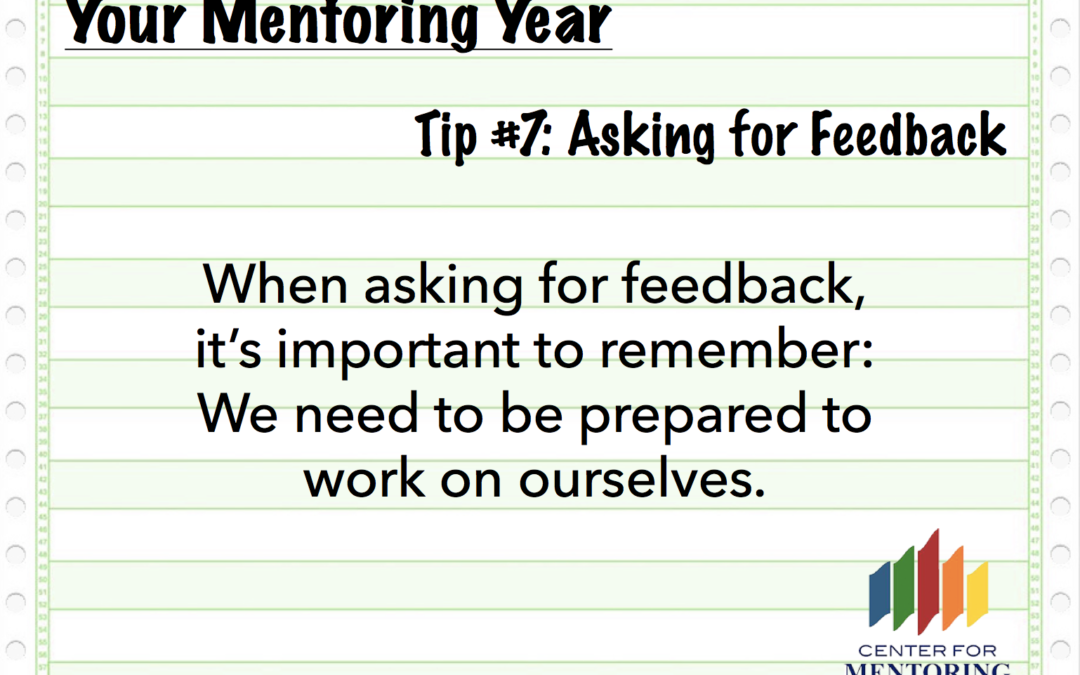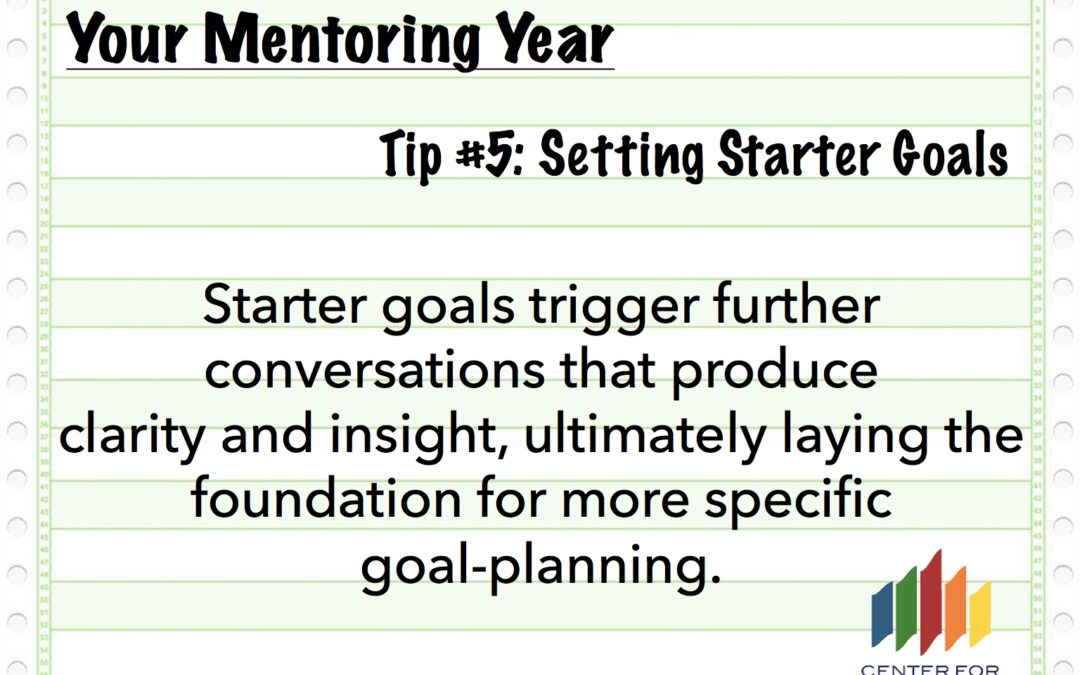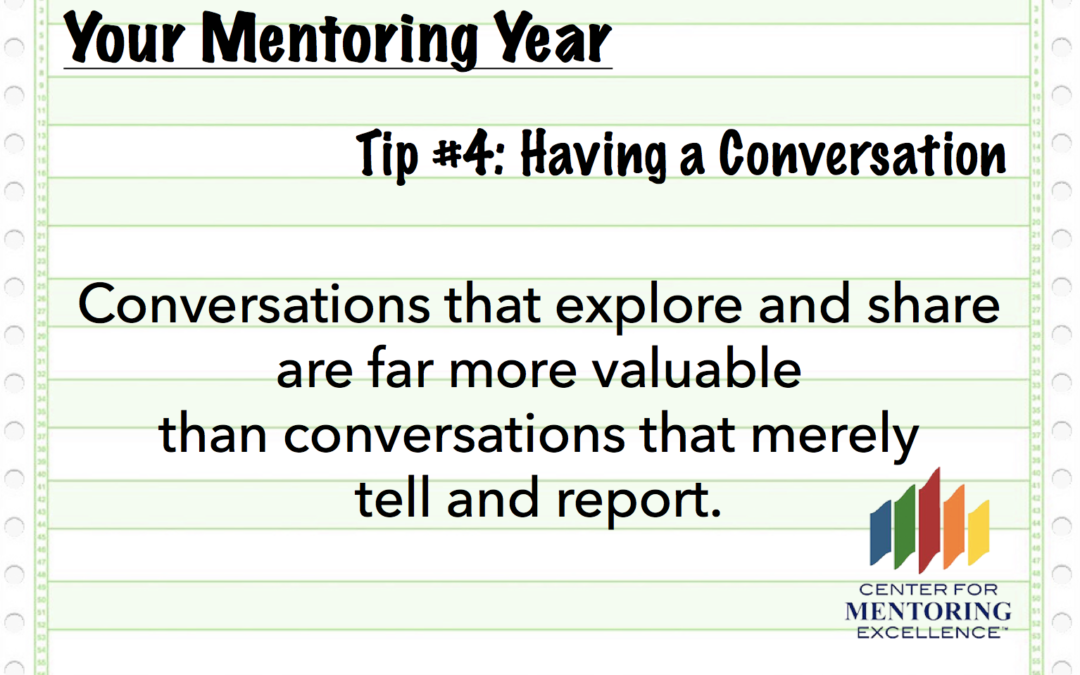
by Center for Mentoring Excellence | Nov 1, 2017 | Facilitating Learning, Growth and Development, Making Mentoring Work For You, Mentoring Communication, Mentoring Relationships, Mentoring Training, Supporting Mentors and Mentees
When we hear the word “feedback,” most of us assume that something is wrong, that we require improvement or that we are going to be criticized.
So, when a mentor says, “Can I give you some feedback?” we brace ourselves. Maybe at best, we approach the message cautiously.
But feedback shouldn’t be feared! Good feedback should identify and reinforce behaviors that contribute positively, while altering behaviors that get in the way. When it comes to feedback, mentees seek confirmation that they are meeting their mentor’s expectations — and they want them to acknowledge it! Starting with praise, and then following with something specific to work on, is a great way to encourage mentees and make them more receptive to feedback.
Here are 6 tips for giving feedback to your mentee.
- Talk about the value of feedback. Let your mentee know to expect it.
- Provide frequent feedback. This ensures your feedback is timely and closely related to the events it refers to.
- Stay balanced. Err on the side of caution. Offer more positive comments than critical comments.
- Be sincere. If positive feedback is forced, it loses value and undermines your credibility.
- Keep it two-way. Feedback should be a conversation, not a lecture. Make sure your mentee is engaged in the conversation. Facilitate a conversation that ensures your mentee understands your input and is motivated to act on your feedback.
- Limit feedback to one or two items your mentee can do something about. Don’t overwhelm them!
At the end of the day, feedback is critical to any mentoring relationship’s success. Making sure mentors know how to give good feedback and mentees know how to receive it are two necessary components of success.
What feedback tips do you have? We’d love your feedback!

by Center for Mentoring Excellence | Oct 12, 2017 | Goal Setting Conversation, Growth and Development, Making Mentoring Work For You, Mentoring Communication, Mentoring Questions, Mentoring Relationships, Mentoring Training, Supporting Mentors and Mentees
Imagine this scenario:
You are hidden in the cubicle next to your supervisor when a colleague drops by to ask her about your performance and contribution to her team. In your dream scenario, your supervisor raves about your work ethic, your analytic skills, your strong relationships with co-workers and members of the leadership team.
That, of course, is what you would like to hear! But in reality, do you have a real handle on what others would say about you? Do you know how your mentor might answer that question?
Managers wish employees would come to them to ask how are they are doing, and what specific areas they should work on. Mentors feel the same way. It’s a lot easier and more comfortable to provide feedback when a mentee seeks it out and is open to working on him or herself. While we all seek positive feedback, we also need to be open to hearing a frank assessment of what holds us back or gets in our way. And, most importantly, we need to be prepared to work on ourselves once an area has been identified.
Here are 5 tips in asking for feedback from your mentoring partner:
- Be clear and specific about what feedback you’re looking for. First, start on a positive note by asking about areas of strength. Then, ask about two areas your mentor feels you need to work on. (Two keeps it limited and doable.)
- Check for understanding (especially around constructive feedback) without getting defensive. If you are unaware of the issues your mentor is raising, ask for an example of where you fell short (again, without being defensive or aggressive). Make sure you agree on what behaviors would help correct deficiencies.
- End the conversation on a positive note. Thank your mentoring partner for their feedback.
- Take time to reflect on what you heard. Think about how the feedback you received might be impacting other areas of your personal and professional life. Set aside any negative feelings you have about what you heard by remembering that this feedback was designed to help you grow and develop.
- Address the areas that have been raised by taking action. Become more conscious about your behaviors and how they affect others and your work. Check in (but not too soon) with your mentor to determine if what you are doing differently is making a difference.
How do you like to ask for feedback?

by Center for Mentoring Excellence | Sep 5, 2017 | Goal Setting Conversation, Growth and Development, Making Mentoring Work For You, Mentoring Communication, Mentoring Questions, Mentoring Relationships, Mentoring Training, Supporting Mentors and Mentees
Last month, we offered some tips about how to set starter goals. As we noted then, the key to exploring starter goals is to get to the heart of the learning need and create specificity around your desired outcome. This month, let’s discuss how to turn starter goals into the kind of goals that help mentees achieve their mentoring objectives — we call these goals “SMART goals.”
SMART goals are goals that are: Specific, Measurable, Action-Oriented, Realistic and Time-bound.
How to create a SMART goal:
- Ask questions to really understand your mentee’s desired outcome. The best way to create SMART mentoring goals is through conversation. Together with your mentee, take a look at the starter goal you created. Make sure you are clear on what success looks like. Be as specific as possible, and drill down until you come up with a way to measure success. Ask: “How will we know if you achieved it?” “What will success look like?” “What will be different when you achieve this goal?”
- Encourage action rather than contemplation. Mentors help mentees create action-focused goals by reminding them that clarity comes from engagement, not thought. Too often we see mentees set goals that start with “I will think about” or “I will explore” or “I will learn.” SMART goals have action words and should answer the question: “What will you DO?”
- Provide a reality check. SMART goals are realistic. Help your mentees set realistic milestones that link to a larger goal. That will keep them motivated and create enthusiasm for further progress. Ask “What are the obstacles to your success?” and “On a scale of 1 to 10, how confident are you that you can overcome those obstacles?” For anything less than an 8, work with your mentee to identify and anticipate obstacles. If obstacles can be overcome, create learning around that. If they cannot, create a more realistic goal.
- Set a deadline. Too often, development goals languish because they feel important but not urgent. Having time-bound goals helps measure progress, create a sense of urgency, generate momentum and provide natural check-in points along the way. Set a date by which the goal should be achieved, and continually track progress towards that date. It’s perfectly appropriate — even, at times, encouraged — for a mentee to choose a lofty goal that will really propel them forward. But unless that goal is broken down into smaller steps, your mentee may get fatigued or burned out. Set timelines for milestones along the way.
How have you used SMART goals in your mentoring relationship?

by Center for Mentoring Excellence | Aug 7, 2017 | Facilitating Learning, Goal Setting Conversation, Growth and Development, Making Mentoring Work For You, Mentoring Communication, Mentoring Questions, Mentoring Relationships, Supporting Mentors and Mentees
The goal-setting conversation is an iterative process that usually begins with “starter goals.” (more…)

by Center for Mentoring Excellence | Jul 7, 2017 | Facilitating Learning, Growth and Development, Making Mentoring Work For You, Mentoring Communication, Mentoring Questions, Mentoring Relationships, Supporting Mentors and Mentees
If you want to have a productive mentoring partnership, you must engage in good conversation throughout your relationship. (more…)







